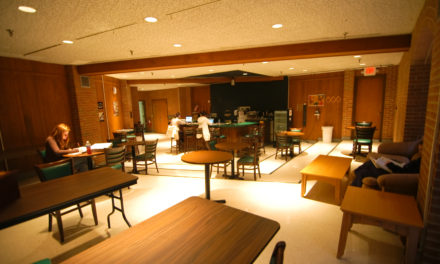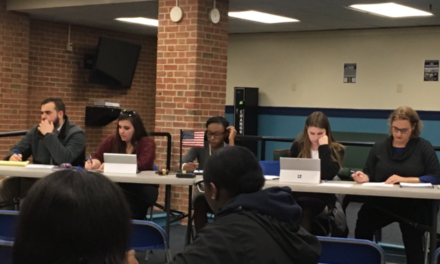By Kabrea Tyler; The Whetstone
Senior Laurie Quinn and sophomore Victoria Albanese said Wesley needs to promote itself more.Â
Quinn transferred to Wesley last year and said other small schools promote themselves more. Â
“The school needs to get its name out more to in- and out-of-state transfers,†she said. “They should do ‘transfer’ events.â€Â
Quinn said Wesley does not promote all the majors as well as they do for nursing.Â
She also suggested a dual enrollment program – where high school students might attend some Wesley classes so they may get interested in the school.Â
Albanese said the only reason she knew about the school is because her mother – an adjunct Math instructor – works here. Â
“The only way you know about Wesley is at a tiny table at a college fair or if you live in the area,†she said.Â
Several new Wesley College administrators said they are working to get the College’s enrollment and retention up.Â
New Head of Enrollment David Buckingham said Wesley is working on attending more college fairs.Â
“The College last year and the year before went to about 70,†he said. “Now we’re going to over a hundred.â€Â
Buckingham said after the fairs, he and his staff follow up with the high schools and talk to the students on-on-one. Â
“We want to know who the student is, their interests, what they would like to get from the college,†he said. “We would like to get their story.â€Â
The Student Success and Retention team is brainstorming, developing, implementing, and assessing programming aimed at increasing retention, said its assistant director Danielle Archambault. Â
“Initiatives include courses that assist students with their transition to college (AS198) and students on academic probation (AS098),†she said. Â
Archambault said SSR also offers other services aimed toward increasing retention. Â
“We have tutoring, disability support, and career services,†she said. “SSR internship opportunities, advising services, academic coaching, seminars for academic success, a textbook cabinet in the Academic Success Center, and providing school supplies, such as planners, notebooks, folders, pens, pencils to students in need.â€Â Â
SSR has held seminars for students designed to assist students to remain at the institution.Â
“Every time we do a seminar, we give the students a survey,†she said. “We take that feedback and use it over the long term of five years. We then redesign those seminars to try and invent new ways to help students.â€Â
Senior Ashli Moore said tuition is too high for the lack of things students are offered. Â
“We pay all this money and get nothing back in return,†she said. “Once students hear about Wesley and the amount of things we don’t do, they no longer want to attend.â€Â Â
According to the Coordinator for Housing Operations Kenny Scharnick, tuition is high and most students who would like to come to Wesley cannot afford it. Â
“Financial aid simply does not cover everything, so we’re looking into getting Pell-grant eligible students through,†he said. “We should be more realistic about who we are recruiting and recruit in areas that are not as need-based.â€Â
Scharnick said he knows there is a limited budget but more things can be done. Â
“It would be helpful if we can promote more, with advertisements, people in the Christian community, or maybe even try music platforms,â€Â he said.Â
The school also will do digital advertising, Buckingham said.Â
“We’ll be on Facebook and Instagram,†he said. “We’re trying to go to the students where they are.â€Â
Soon, Wesley will be accommodating Dover base airmen, Scharnick said, leading to an increase in enrollment. Â
“These airmen will live in Gooding-Williams,†he said. “They will be just like any other students, able to take classes and have a meal plan.â€Â
Archambault said current students and the students to come can be different.Â
“What’s unique about the new class is we switched generations, they’re no longer millennials, they’re Generation Z,†she said. “They have different needs, values and motivations than the millennials.â€Â
SSR is developing and offering professional development opportunities to faculty and staff to help with training the new generation.Â
“One recent opportunity was Mental Health First Aid training, which was held in August,†Archambault said. “We know from data that Generation Z students have challenges in the mental health arena, especially anxiety and depression, and we’re going to see anxiety and depression rates rise. We teamed up with NAMI (National Alliance on Mental Illness) and had their certified instructors train those in SSR and other departments.â€Â Â
Although there are some areas that need a lot of work, Christine McDermott, SSR head, has seen improvement in others.Â
“Commuter retention and persistence has increased,†she said. “The plan is to keep doing what we are doing.â€Â
These last few years has seen a decrease in students who live on campus, and an increase in commuters commuting from home or renting places to stay. Â
Commuter student liaison Carol Gauker said the increase in commuter retention has a lot to do with how much it costs to live on campus. Â
“Most students can’t afford to live on campus, therefore, they commute,†she said. “Students are able to receive the same education but also save a lot of money.â€Â Â
Gauker said there are older people enrolled.Â
“There is now an age difference with students ranging from 18-50 years old attending,†she said.Â
Gauker and commuters have created an organization to make commuter students feel more involved even though they don’t stay on campus. Â
“We now have a Commuter Student Union†she said. “This includes meetings and more activities for those students in hopes of making them feel more comfortable.â€Â
Head of Enrollment Buckingham said his office will be sending out 10 electronic messages to interested students.Â
“We haven’t done that sort of robust outreach in the past,†he said. “Maybe that is one of the reasons we didn’t get the numbers we were trying to get because there wasn’t that constant contacted.â€





